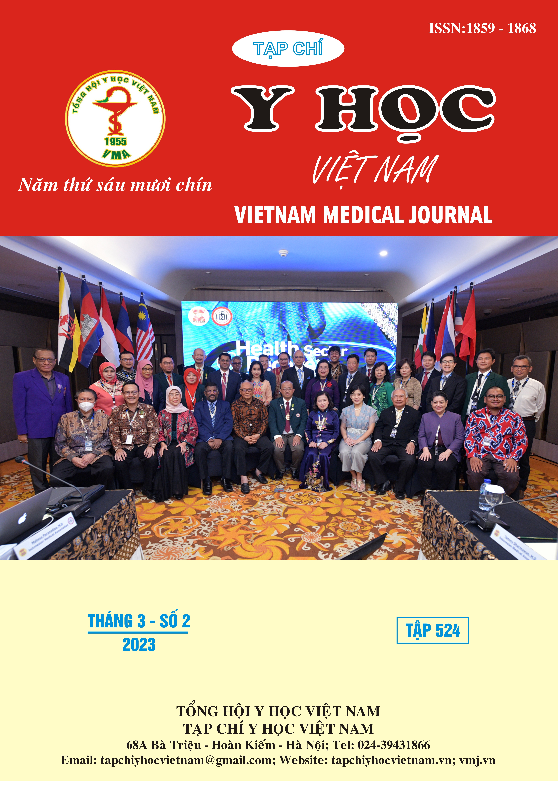KẾT QUẢ NỘI SOI SAU PHÚC MẠC ĐIỀU TRỊ UNG THƯ ĐƯỜNG BÀI XUẤT TIẾT NIỆU TRÊN TẠI BỆNH VIỆN ĐẠI HỌC Y HÀ NỘI
Nội dung chính của bài viết
Tóm tắt
Điều trị ngoại khoa giữ vai trò chủ đạo trong điều trị ung thư đường bài xuất tiết niệu trên. Từ nhiều năm qua bệnh viện Đại Học Y Hà Nội đã tiến hành phẫu thuật nội soi sau phúc mạc cắt thận phối hợp với mổ mở cắt đoạn xa niệu quản và chóp bàng quang điều trị cho nhiều trường hợp ung thư đường bài xuất tiết niệu trên. Nghiên cứu của chúng tôi gồm 40 bệnh nhân mắc ung thư biểu mô đường bài xuất tiết niệu trên trong đó có 28 bệnh nhân hồi cứu và 12 bệnh nhân tiến cứu được phẫu thuật và theo dõi trong thời gian từ năm 2010 đến 2022. Phương pháp nghiên cứu mô tả theo dõi dọc. Mẫu lấy thuận tiện không xác suất. Kết quả: Tuổi trung bình của các bệnh nhân trong nghiên cứu là 62,6 ± 12,35. Nam giới chiếm đa số với 72,5%. Tổng thời gian phẫu thuật trung bình là 136,4 ±28,04phút. Thời gian nằm viện trung bình sau mổ là 7,4 ±1,92ngày. Có 4 bệnh nhân phải truyền máu ngay sau mổ. Không có bệnh nhân nào có biến chứng lớn hơn độ 2 theo phân loại Clavien-Dindo. Có 2 trường hợp bệnh nhân có tái phát tại bàng quang trong vòng 1 tháng sau phẫu thuật. Thời gian sống thêm tính theo phương pháp Kaplan-Meier: từ 0 – 11 tháng là 100%, 12 – 23 tháng là 70%, từ 24 – 35 tháng là 47,5% và từ 36 tháng trở lên là 12,5%.
Chi tiết bài viết
Từ khóa
ung thư biểu mô đường bài xuất iết niệu trên, phẫu thuật nội soi sau phúc mạc
Tài liệu tham khảo
2. Liu JY, Dai YB, Zhou FJ, et al. Laparoscopic versus open nephroureterectomy to treat localized and/or locally advanced upper tract urothelial carcinoma: oncological outcomes from a multicentre study. BMC Surg. 2017; 17(1):8.
3. Liu Wentao, Wang Yinhuai, Zhong Zhaohui, et al. Transperitoneal versus retroperitoneal laparoscopic nephroureterectomy in the management of upper urinary tract urothelial carcinoma: a matched-pair comparison based on perioperative outcomes. Surgical Endoscopy. 2016; 30(12):5537–5541.
4. Keiichiro Mori, Florian Janisch, Mehdi Kardoust Pariz, et al. Prognostic Value of Variant Histology in Upper Tract Urothelial Carcinoma Treated with Nephroureterectomy: A Systematic Review and Meta-Analysis. American Urological Association Education And Research. 2020; 203:1075-1084.
5. Siegel RL, Miller KD, Jemal A. Cancer statistics. CA Cancer J Clin. 2016; 66(1):7–30.
6. Shariat SF, Favaretto RL, Gupta A, et al. Gender differences in radical nephroureterectomy for upper tract urothelial carcinoma. World J Urol. 2011; 29:481–486.
7. Campi Riccardo, Cotte Juliette, Sessa Francesco, et al. Robotic radical nephroureterectomy and segmental ureterectomy for upper tract urothelial carcinoma: a multi-institutional experience. World Journal of Urology. 2019; 37(11):2303-2311.
8. Abe T, Shinohara N, Muranaka M, et al. Role of lymph node dissection in the treatment of urothelial carcinoma of the upper urinary tract: multiinstitutional relapse analysis and immunohistochemical re-evaluation of negative lymph nodes. Eur J Surg Oncol. 2010; 36(11):1085–1091.
9. Lughezzani G, Jeldres C, Isbarn H, et al. A critical appraisal of the value of lymph node dissection at nephroureterectomy for upper tract urothelial carcinoma. Urology. 2010; 75(1):118–124.
10. Kamihira O, Hattori R, Yamaguchi A, et al. Laparoscopic radical nephroureterectomy: a multicenter analysis in Japan. Eur Urol. 2009; 55(6):1397–1407.


